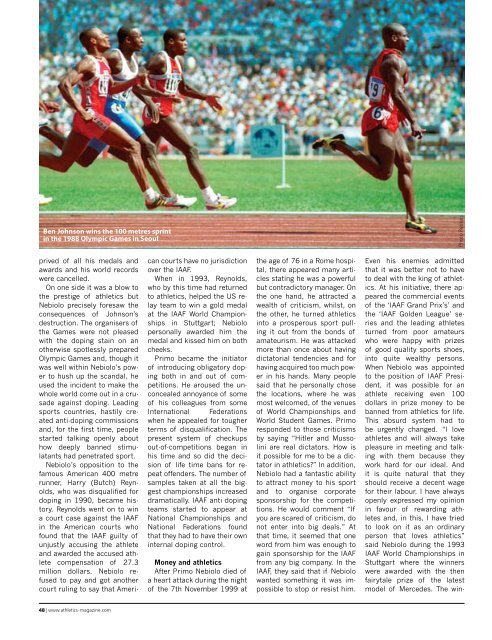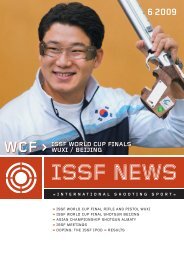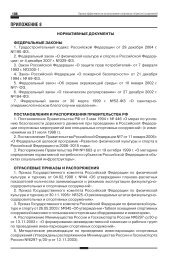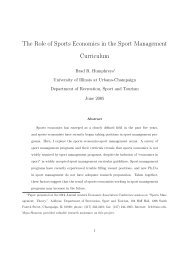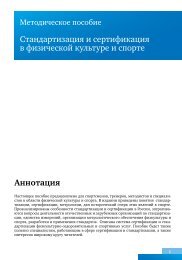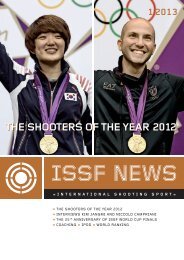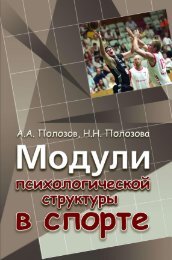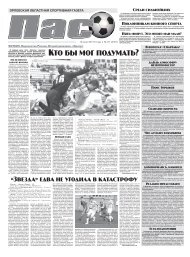You also want an ePaper? Increase the reach of your titles
YUMPU automatically turns print PDFs into web optimized ePapers that Google loves.
event<br />
Ben Johnson wins the 100 metres sprint<br />
in the 1988 Olympic Games in Seoul<br />
prived of all his medals and<br />
awards and his world records<br />
were cancelled.<br />
On one side it was a blow to<br />
the prestige of athletics but<br />
Nebiolo precisely foresaw the<br />
consequences of Johnson’s<br />
destruction. The organisers of<br />
the Games were not pleased<br />
with the doping stain on an<br />
otherwise spotlessly prepared<br />
Olympic Games and, though it<br />
was well within Nebiolo’s power<br />
to hush up the scandal, he<br />
used the incident to make the<br />
whole world come out in a crusade<br />
against doping. Leading<br />
sports countries, hastily created<br />
anti-doping commissions<br />
and, for the first time, people<br />
started talking openly about<br />
how deeply banned stimulatants<br />
had penetrated sport.<br />
Nebiolo’s opposition to the<br />
famous American 400 metre<br />
runner, Harry (Butch) Reynolds,<br />
who was disqualified for<br />
doping in 1990, became history.<br />
Reynolds went on to win<br />
a court case against the IAAF<br />
in the American courts who<br />
found that the IAAF guilty of<br />
unjustly accusing the athlete<br />
and awarded the accused athlete<br />
compensation of 27.3<br />
million dollars. Nebiolo refused<br />
to pay and got another<br />
court ruling to say that Ameri-<br />
48 | www.athletics-magazine.com<br />
can courts have no jurisdiction<br />
over the IAAF.<br />
When in 1993, Reynolds,<br />
who by this time had returned<br />
to athletics, helped the US relay<br />
team to win a gold medal<br />
at the IAAF World Championships<br />
in Stuttgart; Nebiolo<br />
personally awarded him the<br />
medal and kissed him on both<br />
cheeks.<br />
Primo became the initiator<br />
of introducing obligatory doping<br />
both in and out of competitions.<br />
He aroused the unconcealed<br />
annoyance of some<br />
of his colleagues from some<br />
International Federations<br />
when he appealed for tougher<br />
terms of disqualification. The<br />
present system of checkups<br />
out-of-competitions began in<br />
his time and so did the decision<br />
of life time bans for repeat<br />
offenders. The number of<br />
samples taken at all the biggest<br />
championships increased<br />
dramatically. IAAF anti doping<br />
teams started to appear at<br />
National Championships and<br />
National Federations found<br />
that they had to have their own<br />
internal doping control.<br />
Money and athletics<br />
After Primo Nebiolo died of<br />
a heart attack during the night<br />
of the 7th November 1999 at<br />
the age of 76 in a Rome hospital,<br />
there appeared many articles<br />
stating he was a powerful<br />
but contradictory manager. On<br />
the one hand, he attracted a<br />
wealth of criticism, whilst, on<br />
the other, he turned athletics<br />
into a prosperous sport pulling<br />
it out from the bonds of<br />
amateurism. He was attacked<br />
more than once about having<br />
dictatorial tendencies and for<br />
having acquired too much power<br />
in his hands. Many people<br />
said that he personally chose<br />
the locations, where he was<br />
most welcomed, of the venues<br />
of World Championships and<br />
World Student Games. Primo<br />
responded to those criticisms<br />
by saying “Hitler and Mussolini<br />
are real dictators. How is<br />
it possible for me to be a dictator<br />
in athletics?” In addition,<br />
Nebiolo had a fantastic ability<br />
to attract money to his sport<br />
and to organise corporate<br />
sponsorship for the competitions.<br />
He would comment “If<br />
you are scared of criticism, do<br />
not enter into big deals.” At<br />
that time, it seemed that one<br />
word from him was enough to<br />
gain sponsorship for the IAAF<br />
from any big company. In the<br />
IAAF, they said that if Nebiolo<br />
wanted something it was impossible<br />
to stop or resist him.<br />
Photo Reuters<br />
Even his enemies admitted<br />
that it was better not to have<br />
to deal with the king of athletics.<br />
At his initiative, there appeared<br />
the commercial events<br />
of the ‘IAAF Grand Prix’s’ and<br />
the ‘IAAF Golden League’ series<br />
and the leading athletes<br />
turned from poor amateurs<br />
who were happy with prizes<br />
of good quality sports shoes,<br />
into quite wealthy persons.<br />
When Nebiolo was appointed<br />
to the position of IAAF President,<br />
it was possible for an<br />
athlete receiving even 100<br />
dollars in prize money to be<br />
banned from athletics for life.<br />
This absurd system had to<br />
be urgently changed. “I love<br />
athletes and will always take<br />
pleasure in meeting and talking<br />
with them because they<br />
work hard for our ideal. And<br />
it is quite natural that they<br />
should receive a decent wage<br />
for their labour. I have always<br />
openly expressed my opinion<br />
in favour of rewarding athletes<br />
and, in this, I have tried<br />
to look on it as an ordinary<br />
person that loves athletics”<br />
said Nebiolo during the 1993<br />
IAAF World Championships in<br />
Stuttgart where the winners<br />
were awarded with the then<br />
fairytale prize of the latest<br />
model of Mercedes. The win-


